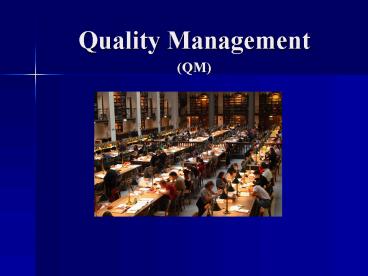Quality Management - PowerPoint PPT Presentation
1 / 10
Title:
Quality Management
Description:
Concern for continual improvement: Total QM (TQM) is a commitment to never be ... infra- structure. customer. Application of EFQM to Higher Education ... – PowerPoint PPT presentation
Number of Views:60
Avg rating:3.0/5.0
Title: Quality Management
1
- Quality Management
- (QM)
2
Topics of QM
Part I
- Concern for continual improvement Total QM (TQM)
is a commitment to never be satisfied very good
is not good enough - Improvement in the quality of everything the
organization does TQM uses a broad definition of
quality - Accurate measurement TQM uses techniques to
measure very critical performance variables.
These variables are compared against standards or
benchmarks - Empowerment of employees TQM involves the people
on line in the improvement process
3
General Model of QM
Organization human resources
Planning Decision making
Management Tasks
Measurement comparison
Improvement
4
QM after ISO 9001
Responsibility of the management
Audit
Measurement, analyses, and improvement
Management of resources
Performance at the University research, teaching,
administrative
5
European Foundation for Quality Management
Excellence Model (EFQM)
Enablers
Results
Employee results
Employees
Leadership
Key performance results
Processes
Policy strategy
Customer results
Partnerships resources
Society results
Innovation and Learning
6
Option to Derive a Score than use RADAR Logic
Determine Results required
Plan develop Approaches
Assess Review
Deploy approaches
7
Evaluation what is it?
- Originally, developed to assess research
- performance
- Generally, it includes procedures of audit and
self assessment - The process of evaluation exists of 4 analogue
- features to EFQM
- organization and planning of judgment
- collection and analyses of data
- point out the potential of improvement
- realization of the improvement on basis of a
contract management
8
Application of EFQM to Higher Education
Evaluation Topic Corresponding to
EFQM
mission statement, alliances, institute,
department, budget, organization, pr-work,
internationality
leadership, policy strategy partnerships
resources, society results
university
research field
leadership, policy strategy, partnerships
resources, customer results (applied field)
objectives, equipment, research topics, equal
rights for women, faculty co-operation,
staff composition
study program
profile, curriculum, actual contents,
coordination definition professional field,
career-orientation
processes
contents, coordination with colleagues, lecture
type number of students, student evaluation
processes, customer results
lecture
teaching staff
qualification, publications, research experience,
internationality
employees, employee results
number of tutors, qualification, continuing
education
employees, employee results
tutor
services
opening hours, equipment, level of qualifications
employees, partnerships resources, processes
infra- structure
labs, equipment, localization, use, sharing
partnerships resources
acquisition, choice, satisfaction of students,
mean (median) of grades, duration of studies,
supplementary qualifications, continuing
education, job prospects, alumni activities,
identification with the alma mater
processes, customer results, key performance
results
customer
9
Summary
- the objectives and the processes of evaluation
are comparable and compatible to the EFQM - but
- evaluation as a tool of quality management can
not - be reduced to the evaluation of research output
and - to student judgment
10
- processes of evaluation have to be embedded into
a comprehensive concept of total quality
management including three main columns - research
- teaching
- administration
- EFQM represents a useful tool in administration
- but should be modified/adapted in research and
teaching































